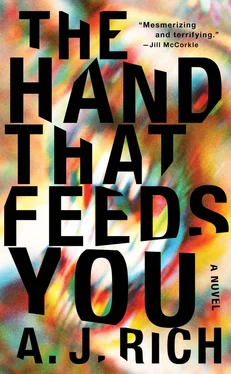“The night I described was off Saint John. I’d like to go back there again.”
But everyone who flies into St. Thomas ferries over to St. John, and Billie had said she was going to St. Thomas. To pick up patty-cakes.
“The Stilton is really good,” McKenzie said, reaching for the knife and another cracker.
He was changing the subject, but I wouldn’t let go. “It must be hard for you to dive again.”
“I haven’t yet. But I’m ready, I think.”
Now I wanted to change the subject. Now I was afraid to learn that they were going on a diving trip together. I was sorry I had brought it up in the first place. So I forced McKenzie back into being my lawyer. “If it turns out that Cloud was locked in the bathroom, is there a chance she could come home?”
“We’re entitled to an appeal.” He looked at his watch.
I preempted his excuse to leave by thanking him for bringing over the photographs. I did not thank him for the hacker information, as he had not wanted acknowledgment. At the door, he told me to take care of myself.
• • •
I went down Grand Street toward the BQE. I noticed, as I often did, the number of pit bulls being walked by the younger residents of the neighborhood. Nowhere else had I seen so many of them as well-cared-for pets. I had my theories about why — that they were the most misunderstood and misjudged breed, that they were, in a sense, like tattoos, like instant gangsta cred (even though most of them were mushes), that young people wanted to adopt a rescue and the breed clogging all shelters was the pit bull. I’d several times seen a poster of a pit bull in shop windows: “Born to love, taught to hate.” And another one: “For every 1 pit bull that bites, there are over 10.5 million that don’t. Stop bullying my breed.”
Near yet another construction site, I found the address I had been given by hackyou. The storefront was filled with cheap religious figurines such as one sees in the bay windows of private homes or underfunded churches in the neighborhood. I double-checked the address, given what filled the display window, and saw that I had come to the right place. I walked in, a bell chimed, and a zaftig woman of around thirty, in a black dress that resembled a nun’s habit, came from the back and asked if she could help me.
“I was given this address but I think I might have written it down wrong. Do you fix computers here?”
“You’re McKenzie’s friend?”
“So I am in the right place. But what’s with the religious statues?”
“Have you heard the one about the mohel in the clock shop? So a guy’s looking for a place to find a mohel. He finds 273 Main Street, and the whole place is filled with clocks. He says to the guy at the counter, ‘I’m looking for a mohel.’ And the guy says, ‘That’s me.’ ‘But what are all these clocks doing in the window?’ And the guy says, ‘What do you want me to put in the window?’ ”
I followed her into the back room, which was as surprising in its own way as the front. There was a single laptop, not the gadgetry they always show in the movies. I said I was surprised that she could hack with one ordinary computer.
“Breaking into an e-mail account isn’t hacking. It’s cracking. Hacking is an art. It’s discovering and exploiting the weaknesses in technology. Without hackers, we wouldn’t have a hope of privacy.”
“That sounds like the opposite of privacy.”
“Hacking isn’t personal. It’s about decentralizing information and giving it away for free. I’m talking about government and corporate information, not catching some congressman looking at pornography in his home.
“So tell me what I can do for you.” The woman had not given me her name.
“I need to find out if someone sent e-mails to herself as though from another person, or if these e-mails were, in fact, sent to her by someone else.”
“I can tell if they’re sent from the same IP address. It’s possible to reroute a message so that it appears to originate from a different IP, but you’d have to be a pro. And I can tell if this was done.”
She asked me for the server and user ID, then started typing. She said that the most popular password is password. The second most common password is 123456. The third-ranking password is 12345678. And one in six people use the name of a pet.
“Does Samantha have a pet?”
I told her I didn’t know.
“Let’s see if she has pet insurance.” The woman ran Samantha’s name through some kind of database. The computer was facing her, so I could not see exactly what she was doing. I looked at the religious statues — a chipped Virgin Mary, a weathered apostle, an armless St. Christopher. Did anyone ever repair them?
“Samantha Couper has pet insurance with the ASPCA for a six-year-old shepherd mix named Pal, with Cushing’s disease.”
So we all had sick, injured, or rescued dogs. If coincidence, it was odd for a man who didn’t like dog hair on his clothes. If not, then Bennett was a predator drawn to the goodness he lacked. In that case, he was the man I could build my thesis on. My pulse picked up and, for once, not in fear.
The woman typed in something new. She typed in something else. And again. On only her sixth try, she smiled. “MyPal. What is the username you suspect she’s using to write herself?”
I gave her Bennett’s e-mail — themaineevent@gmail — the only e-mail address he had used with me. The woman typed it in and turned the computer so that I could see the screen. Hundreds of messages came up. About a quarter of them after his death. Again, I nearly swooned — that old-fashioned word — at the shock of seeing the username that I had once longed for.
I asked her to open the first one dated after his death. I began reading: Sam, did you get to the bank? Did you find your passport? I trust you. I love you. We’re almost there.
“Can you tell if she sent this to herself?”
“If she sent it to herself, she didn’t use the same computer.” The woman clicked on an icon I’d never before seen. “You ping an address, and this sends a signal to a URL — like sonar — and it bounces back and you can determine how long the round-trip took. You press return and the IP address appears, followed by how many seconds or milliseconds the ping took. I know this was sent from around here.”
Either she was sending them to herself from my neighborhood and following me around, or someone I didn’t know was sending them from my neighborhood. Both scenarios scared me; I could think of no reasonable way to protect myself.
“Can you do one more thing for me? Can you find me the password for themaineevent?”
The woman quickly eliminated the most popular passwords. “This guy, Jeremy Gofney, created a twenty-five-computer cluster that can make three-hundred-and-fifty-billion guesses a second. But it will take me between thirty minutes and six hours. Why don’t you head out, and I’ll text you when I get it.”
I got a coffee to go from Gimme! Coffee and went home to walk Olive. I decided to take her to Cooper Park for a change, not as big as McCarren Park, but, pleasingly, on Olive Street. And the chances of finding small dogs for Olive to play with were better there. But on this winter afternoon, even Olive’s cable-knit sweater didn’t keep her warm enough, so I put her inside my coat and we sat on a bench.
Where was Samantha planning to go that she needed a passport? Or where was she being urged to go? Would this be something she would write to herself? Only if she expected someone else to see it. And why would she stop writing to herself after this? Or why did the person who might have sent this message stop?
Olive squirmed inside my coat and brought me back to the here and now, the simple needs of a living creature. Thinking she had to pee, I put her down, but she refused to go. So I tucked her back inside my coat and walked quickly home. I mimicked the tired gestures of someone being pursued — looking first over one shoulder, then the other. I didn’t have it in me to fake the confident stride that would supposedly ward off an attacker.
Читать дальше

![Корнелл Вулрич - Eyes That Watch You [= The Case of the Talking Eyes]](/books/32103/kornell-vulrich-eyes-that-watch-you-the-case-of-thumb.webp)









